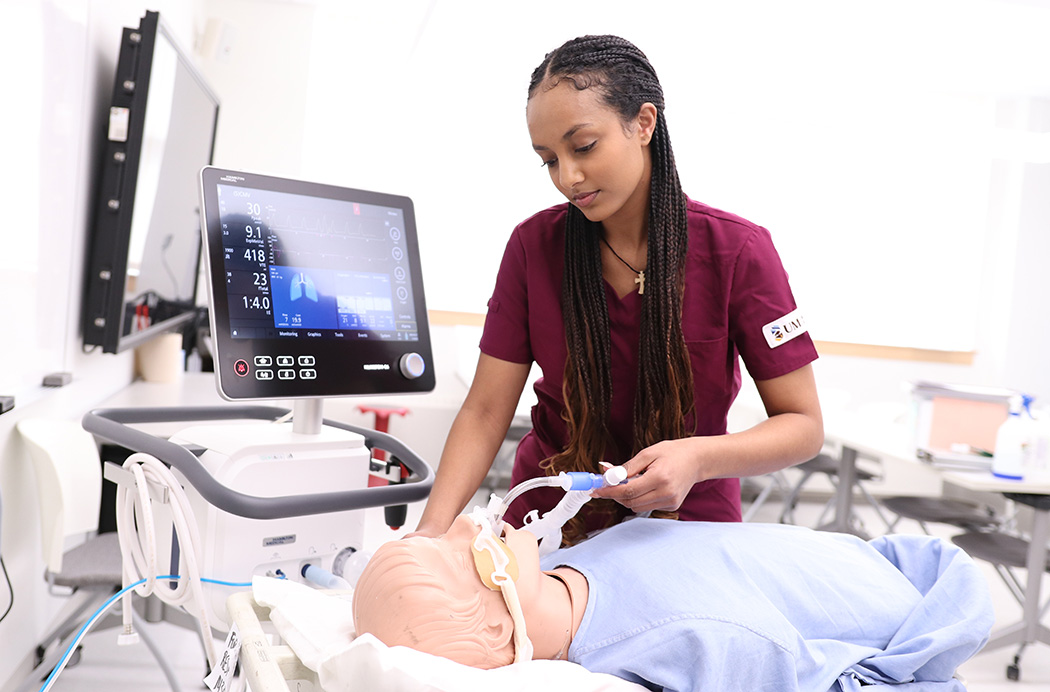
Respiratory therapy student an advocate for the profession
Wintana Mokonnen was 17 when she first heard the term “respiratory therapy” (RT) while volunteering at Health Sciences Centre (HSC). Today, at 21, she is a passionate advocate for the field that she’s chosen.
A second-year RT student at the College of Rehabilitation Sciences in the Rady Faculty of Health Sciences, Mokonnen runs a student Instagram page for the program, with help from some first-year students, to “spread the word” about the profession.
She also works at HSC’s Women’s and Children’s hospitals as an RT assistant, a role that was created for students during the COVID pandemic to address the need for more respiratory therapists.
Mokonnen was born and raised in Winnipeg. Her parents moved to Manitoba from Eritrea, Africa in 2003. The middle of three children, she had an interest in health care from a young age. Inspired by her mother, a health-care aide for nearly 20 years, she began volunteering at St. Amant Centre at the age of 14.
“I’ve always loved giving back to my community. My parents were very fond of volunteering, and I think that just got passed down onto me,” Mokonnen said.
She also credits her godmother, Dr. Yohanna Asghedom, an alumna of the Max Rady College of Medicine, as an influence.
“She is like an older sister and best friend in one. Growing up I got to see her unique journey as a black student and doctor in health care and I have been able to lean on her for a lot of support.”
UM Today recently asked Mokonnen three questions.
What is your favourite part of studying respiratory therapy?
I really love how supportive everyone is. I did a year of undergrad studies to get my prerequisites, and the classes were huge. It was hard to meet people and build a connection with the professors. But RT is a smaller program, so everybody’s close to each other. You really get to know the staff, faculty members, associate professors and classmates. It’s a great support system, because it is a challenging and accelerated program. You have support all around you. It’s the perfect environment to be in.
I’ve also loved the clinical rotations. When I was up in Brandon, Man., for a week, I got to see a surgical tracheostomy, which is a surgical incision that is made in the neck to help patients breathe. I got to follow the patient from the ICU to the operating room and back. Seeing that transition of care and following that patient for a whole week was really amazing.
What has surprised you the most about the program?
I honestly didn’t know how much we did. We are such a big part of the health-care team. We are highly trained in mechanical ventilation initiation and management, providing oxygen therapy, assisting in bronchoscopy, and advocating for our patients. There are a lot of contributions we make to the team that a lot of people don’t know about, let alone know what the career itself is. We’re always at the bedside, talking to our patients and making sure we give them the best care possible. Oftentimes, when people are going through the toughest times of their life, we’re right by their side ensuring they are comfortable, safe and heard.
What do you look forward to most about working in RT?
When I started, I was honestly just focused on getting through the program. It’s very intense and fast-paced. But now I’m getting ready to enter my third year, which is all clinical rotations, so I’m starting to think more about where I want to work. Currently in my RT assistant position, I’m working with pediatrics and neonates. I really love that environment and how specialized it is, but I’ll probably have a better idea of where I want to be once I go through my clinicals.
I would also love to work in a rural setting. If a job came up where I could go and work up north, I would love to do that. Growing up in Canada reminds me how privileged I am to live on this land, and seeing the inequalities and health disparities that Indigenous people face disheartens me. It would be amazing to use my education and what I’ve worked to achieve to give back to underprivileged communities.






